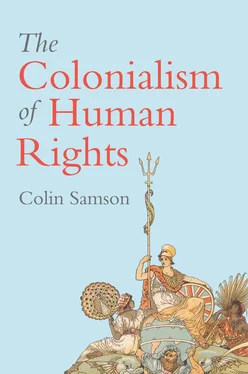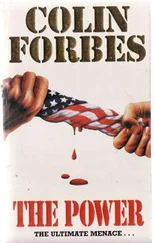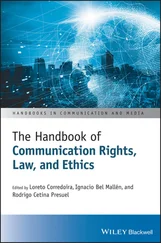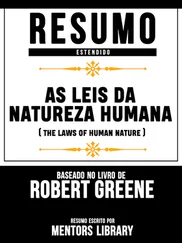Universal human rights seemingly sit uncomfortably in a world of white privilege, and consequently, as Charles Mills points out, it is rare that legal and philosophic disquisitions on rights are brought into conversation with topics such as colonialism, slavery and racism. 3Meaningful dialogue about universal human rights today is therefore uneasy, and much of it currently revolves around outwardly raceless legal prose and official pronouncements. Western inheritances of Enlightenment thought, the principles of popular sovereignty emerging out of the American and French Revolutions, nineteenth-century liberalism, the 1948 UDHR and the various official proclamations of human rights since then are often taken as emblematic of some primordial quality of ‘civilized societies’. Consequently, it might be understandable that Europeans and Euro-Americans are proud of the principles of rights and democratic government that they believe they have inherited and disseminated because these emerged after long periods of sacrifice, war and social and intellectual struggle against class oppression and despotism in Europe. So powerful is this pride that abstract conceptions of rights within representative government are central to Europe’s political thinking. From the franchise to impartial social justice, freedom of expression to the right to the fundamentals of life, human rights are a key indicator of the inevitable movement of global history in Western thought.
This universalism does not mean that either the early theorists of rights or their colonizing compatriots acted without reference to cultural variation, but that universalizing occurred within a hegemonic process that delegitimizes other renderings of history and rights. 4Nevertheless, there were many times when colonial administrations had to tolerate, and even accept, traditional and customary laws 5– for example, when they were demographically outnumbered. In India, the British incorporated some indigenous norms within colonial administration, but ‘instead of abiding by the local definition, they redefined and invented customs and traditions as per Western ideologies and the aims of British imperialism’. 6Sen suggests that this was partly because Indian customs were more humane than British laws.
Their sense of cultural superiority largely meant that colonial agents who were adjudicating rights and responsibilities were often dismissive of rival values among those they administered. Although universalism is ostensibly raceless, Enlightenment philosophers of rights used race as an important category to differentiate human qualities along one universal continuum. Prominent, but not alone, among liberal thinkers is Immanuel Kant, who distinguished gradations of personhood and rights based on the premise of white superiority. 7Georg Wilhelm Friedrich Hegel developed his master–slave dialectic as the Atlantic slave trade and the rebellion of enslaved Africans in Saint-Domingue (which became Haiti) were taking place. He made no reference to these events, 8possibly because of his evident contempt for Africans in Dialectics of History . Indeed, the Haitian Revolution of 1791–1804, which led to the first independent black republic, is largely ignored in scholarly accounts of the origins of human rights. 9Instead of being praised as an exemplar of universal values and the ‘Rights of Man’, Haiti quickly became indebted to its former enslavers, and had to pay huge financial compensation to France to obtain international recognition. 10
Another Enlightenment figure, John Locke, was General Secretary of the Board of Trade and Plantations, which regulated British slave trading. He was also a shareholder in two slave-trading companies, including the Royal Africa Company at a time just before the massive expansion of British slave trading. 11Locke’s idea of representative government through consent to the social contract did not encompass African people. In fact, he argued that slaves cannot be part of the social contract, and hence by default can legitimately be subject to absolute or arbitrary authority. The enslaved Africans that he had such an important role in administering go unmentioned in the ‘Of Slavery’ chapter of The Second Treatise on Government . In parallel, fellow liberal thinker Jean-Jacques Rousseau made explicit that slavery could never be based on consent, the basis for all social contracts, but even he makes no reference to European enslavement of Africans in the ‘Of Slavery’ chapter of The Social Contract of 1791. 12Likewise, other French philosophes were either indifferent to the enslavement of Africans or took many years to pronounce against it. 13
Thus, it must be, as Mills argues through the concept of the racial contract, 14that race is a shaping constituent of Western liberal ideals, prominently including those involving rights as well as duties and government responsibilities. Mills’ racial contract is intended to critique and replace the social contract, the mythical transaction whereby individuals in a perilous, insecure ‘state of nature’ are asserted to forgo voluntarily natural rights to autonomy in return for protections and legal and police powers of the state. Under Locke’s social contract, the state is therefore legitimated by popular consent, thus establishing firm links between the state, rights and democracy. The social contract individuates people, removing them from formerly autonomous cultural communities that are depicted as primitive and lacking protections. Following Mills, we could say that if a real social contract were to exist, it would be an arrangement leading to racially differentiated relationships to the state, and, via colonialism and slavery, these would be cemented together through compulsion and violence.
An example in which particular attributions about specific groups get translated into structurally embedded denials of supposedly universal rights is contained in Locke’s ‘Of Property’. 15The outwardly secular Locke held that rights to property could only be claimed by farmers who worked as God intended. This seemingly random assumption meant, above all, labouring and improving the soil. Such a stipulation conveniently invalidated land rights for American Indians in North America since, in Locke’s erroneous view, Indians were simply wandering hunters. Their property was therefore vested only in the animals they killed. Through this contrivance, indigenous people could – and were – deprived of their lands by English colonists, who often took land on this basis. 16In formulating a ‘principle’ for property ownership, Locke misrepresented both indigenous societies who often ‘improved’ soil by alternating hunting and farming practices, and English farmer colonists whose agriculture often exhausted the soil and depleted the natural environment. Therefore, because such a fundamental right as that to land was made to apply differentially under settler colonialism, the liberal social contract became a lever of dispossession. Likewise, the absence of any mention of African slaves in relation to the social contract by liberal formulators of rights such as Locke and Rousseau makes racially segmented rights the default position.
Nevertheless, philosophies allied to the French and American Revolutions and Enlightenment have featured in genealogies of human rights. Todorov’s affirmative interpretation of the inextricable Enlightenment linkages to democracy and human rights illustrates such claims:
Our knowledge of the world has progressed freely, without ideological prohibitions causing too much concern. Individuals do not fear the authority of tradition as much any more and try to manage their private space by themselves, enjoying all the while great freedom of expression. Democracy, where popular sovereignty is exercised with respect for individual liberties, has become a model cherished or desired everywhere. Universal human rights are considered a common ideal and equality before the law is the rule in any legitimate state. Pursuing personal happiness or common welfare are personal choices that no longer shock anyone. 17
Читать дальше












